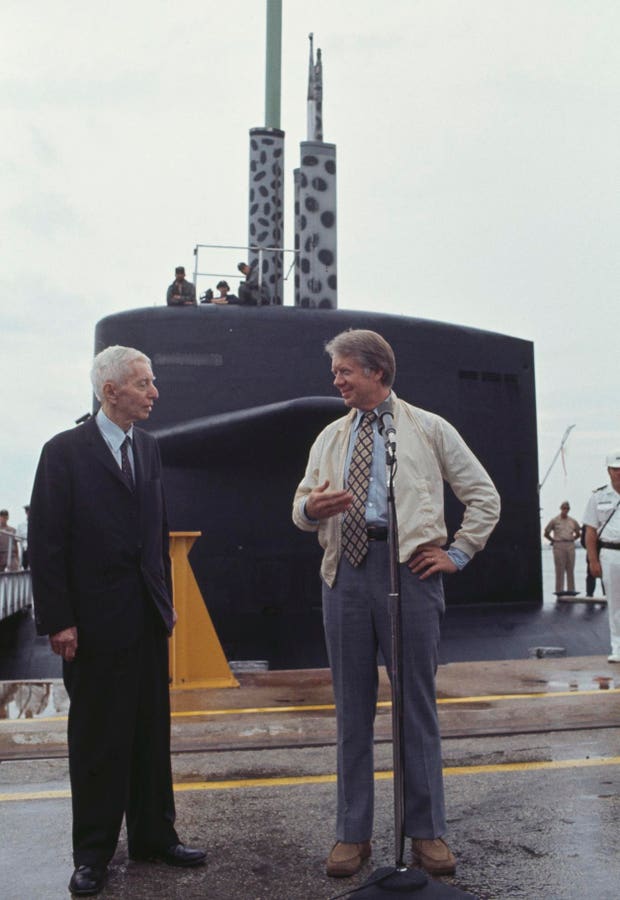The Power of "Did You Do Your Best?": A Leadership Lesson from Jimmy Carter and Admiral Rickover
The pursuit of victory, whether in the arena of sports, the boardroom, or the broader game of life, is a common human aspiration. Yet, the true measure of character, and ultimately, the will to win, may reside not in the outcome itself, but in the honest answer to a single, profound question: "Did you do your best?" This question, posed by Admiral Hyman Rickover to a young Navy Lieutenant Jimmy Carter, encapsulates a powerful leadership lesson that resonates across individuals, teams, and organizations striving for enduring success. Carter’s response, a candid admission that he hadn’t always given his utmost, reveals not weakness, but a foundation of humility, self-awareness, and a commitment to continuous improvement that would shape his remarkable life and career.
Carter’s encounter with Rickover, the formidable father of the nuclear Navy, occurred during a crucial interview that would determine his future. Having graduated 59th out of 820 midshipmen from the United States Naval Academy, Carter anticipated praise for his academic standing. Instead, Rickover pierced through the veneer of achievement, demanding introspection with his pointed query. Carter’s honest "no" was a testament to his integrity and a recognition that potential remained untapped. This unexpected exchange, far from disqualifying him, impressed Rickover. Carter was selected for the nuclear program, an experience that would hone his leadership skills and instill a lifelong commitment to striving for excellence, a principle he would carry with him to the Oval Office and beyond. The encounter highlights the importance of honest self-assessment, a critical element in fostering growth and resilience.
The anecdote of Carter and Rickover serves as a potent reminder that effort, while essential, must be channeled effectively to achieve desired outcomes. Mere exertion without direction is akin to navigating a ship without a compass. To maximize the impact of "doing your best," individuals and organizations must establish clear objectives, implement robust performance measurement systems, and cultivate a culture of regular, constructive feedback. The SMART goals framework, which emphasizes specificity, measurability, achievability, relevance, and time-bound targets, provides a practical roadmap for translating effort into tangible results. By aligning individual actions with overarching goals and providing consistent feedback, leaders can foster a sense of purpose and accountability, ensuring that every ounce of effort contributes to meaningful progress.
Furthermore, fostering an environment of honest self-reflection, as exemplified by Rickover’s probing question, is paramount to cultivating a culture of continuous improvement. Organizations that prioritize transparency and accountability, where individuals feel empowered to acknowledge shortcomings without fear of reprisal, create fertile ground for growth and innovation. Just as Carter’s candid response became a catalyst for personal development, businesses must embrace honest assessments of their performance and processes. Identifying areas for improvement requires acknowledging weaknesses, a starting point for implementing corrective measures and driving positive change. This commitment to continuous improvement, fueled by honest self-reflection, becomes a powerful engine for organizational growth and sustained success.
The principles of continuous improvement are deeply ingrained in the practices of high-performing organizations across various sectors. The military’s After-Action Review (AAR) process, which encourages reflection on past actions to identify lessons learned and improve future performance, embodies this ethos. Similarly, Pixar’s "Braintrust" meetings, where candid feedback is actively encouraged, foster a culture of open communication and collaborative problem-solving. Google’s emphasis on psychological safety, enabling team members to express themselves freely without fear of negative consequences, underscores the importance of creating an environment where constructive criticism is valued as a tool for growth. These diverse examples demonstrate the universality of the principle: honest feedback, coupled with a willingness to learn from mistakes, is the cornerstone of continuous improvement.
However, even with the best intentions and diligent effort, setbacks are inevitable. Resilience, the ability to bounce back from adversity, is an essential quality for individuals and organizations alike. Carter’s life journey, marked by both triumphs and tribulations, exemplifies the power of resilience. From his initial defeat in the Georgia gubernatorial race to the challenges he faced during his presidency and his personal battles with cancer and the loss of loved ones, Carter consistently demonstrated an unwavering ability to persevere. His commitment to service, his unwavering pursuit of peace and human rights, and his enduring legacy as a humanitarian icon are testaments to the strength of his character and the resilience he cultivated throughout his life.
The enduring lesson from Jimmy Carter’s encounter with Admiral Rickover is the transformative power of honest self-reflection and the relentless pursuit of improvement. The simple question, "Did you do your best?" transcends the context of a naval interview, becoming a timeless principle applicable to every facet of life. By embracing a culture of transparency, fostering open communication, and prioritizing continuous learning, individuals, teams, and organizations can unlock their full potential, transform challenges into opportunities, and achieve lasting success. This is the legacy of Carter and Rickover: a testament to the enduring power of honesty, effort, and the unwavering pursuit of excellence.











